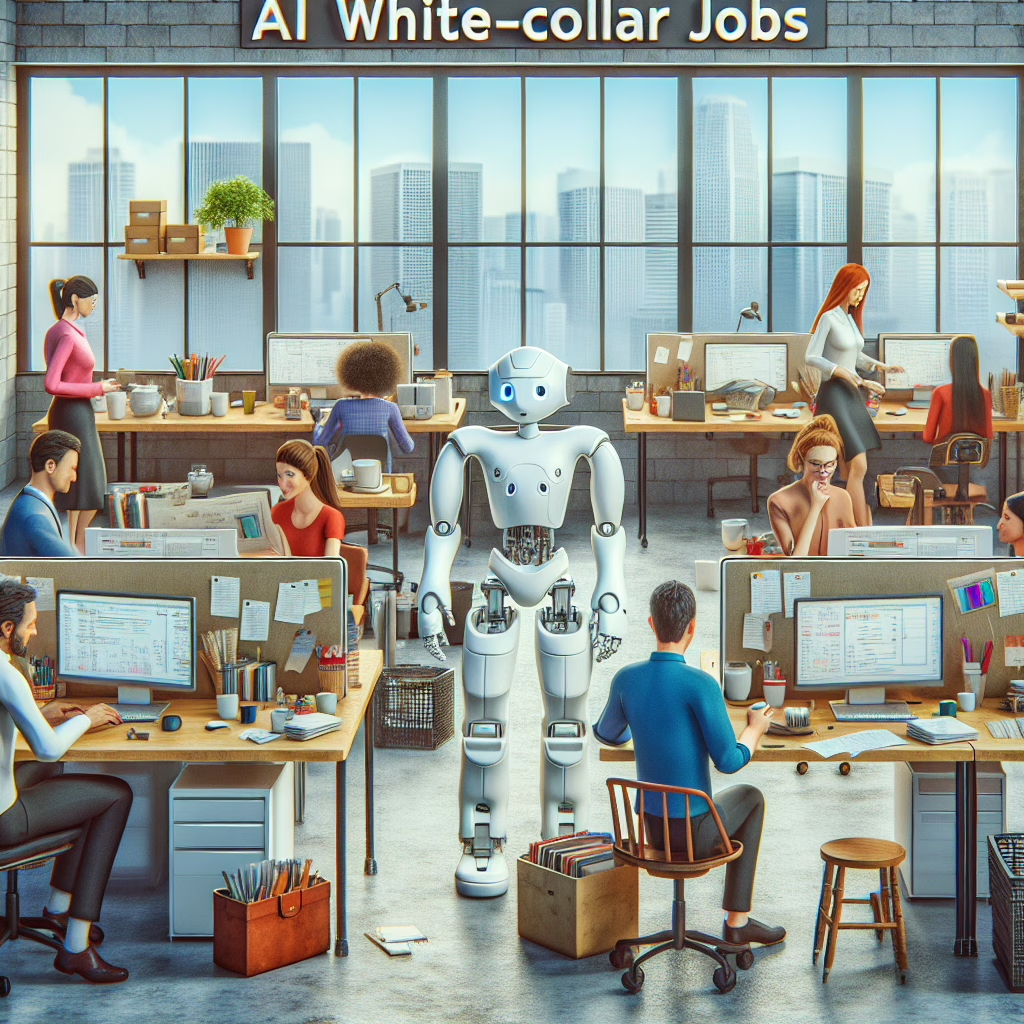As we wade through the tech-infused waters of 2025, the question on everyone’s lips is: Are white-collar jobs at risk from AI? Dario Amodei, the big cheese at Anthropic, certainly thinks they might be. But before we all start polishing our résumés for a potential career in artisanal bread-making or llama grooming, let’s take a closer look at what this all means.
AI: The New Colleague We Didn’t Ask For
Imagine walking into the office one day and finding your desk occupied by a sleek, emotionless robot named “Bob.” Bob can type faster than you can say “algorithm” and has never once taken a coffee break. Sounds great, right? Well, not so fast! While it’s true that AI is increasingly capable of handling tasks traditionally assigned to humans, it’s essential to keep in mind that this doesn’t mean we’ll all be out on the streets with cardboard signs begging for spare change—at least not just yet.
Amodei argues that white-collar jobs are indeed at risk, especially those involving repetitive tasks or data analysis. Think about it: if Bob can analyze spreadsheets while simultaneously drafting emails and making perfect lattes, what’s left for us mere mortals? However, this doesn’t mean we should throw in the towel; instead, it’s an opportunity for us to upskill and become the experts that AI can’t replace!
The Silver Lining of AI Integration
Now, let’s put on our rose-colored glasses for a moment. While AI might threaten certain roles, it also opens up new avenues. For every job that AI automates, new ones will emerge—like “AI Ethics Compliance Officer” or “Human-AI Collaboration Specialist.” These positions might not be as exciting as “Chief Unicorn Officer,” but they could provide stability in our ever-evolving job market.
Moreover, with AI taking over mundane tasks, human workers can focus on creativity and innovation. Remember when your boss asked you to come up with a groundbreaking marketing strategy while you were drowning in data entry? Well, now you might actually have time to think outside the box—or at least outside your cluttered cubicle!
Embracing Change: The Key to Survival
So how do we prepare for a future where AI could potentially dominate the white-collar landscape? First off, embrace lifelong learning. The days of graduating and considering your education complete are long gone—sorry to burst your bubble! With technology evolving at warp speed, continuous learning is essential. Enroll in courses that teach you about AI applications in your field or dabble in coding.
Secondly, honing soft skills like emotional intelligence and critical thinking will make you irreplaceable. After all, no matter how advanced Bob becomes, he’ll never be able to understand your existential dread on a Monday morning—or perhaps he just might.
The Human Touch: An Undeniable Advantage
While AI can crunch numbers and analyze data faster than we can blink, it lacks one crucial element: the human touch. Empathy, creativity, and ethical judgment are areas where humans excel. As much as Bob might try to simulate compassion when delivering bad news or brainstorming ideas for a new project, he simply can’t match human intuition.
Jobs that require complex interpersonal interactions—think therapy sessions or negotiations—will always need that personal touch. So while some positions may fade away into the sunset due to AI advancements, others will flourish as they demand human qualities that machines simply cannot replicate.
Conclusion: A Collaborative Future
In summary, while Dario Amodei might suggest that white-collar jobs are at risk from AI advancements, it’s essential to view this transition through a humorous lens. Rather than fearing our robotic counterparts, let’s welcome them as colleagues who will handle the boring bits while we unleash our creative potential!
So what do you think? Are you ready to embrace the future with open arms—and maybe a little bit of sarcasm? Let us know your thoughts in the comments below!
A special thank you to TechRadar for providing insights that inspired this article!
Exploring the Future of Work
As we navigate the challenges posed by AI, it’s crucial to discuss the overall impact on white-collar jobs. This technological wave isn’t just about displacement; it’s about evolution. The workplaces of the future will likely require hybrid skill sets that mix technical expertise with soft skills. Here are some undoubtable trends to keep in mind:
- Increased Demand for Tech Skills: Professionals will need to integrate AI tools into their daily tasks, making tech literacy a cornerstone of white-collar roles.
- Critical Thinking and Decision Making: As AI provides insights, employees will be expected to interpret this data and make informed decisions.
- Collaboration with AI: Employees will work alongside AI systems, harnessing technology to improve productivity.
Future-Proofing Your Career
To stay relevant in a tech-driven world, consider the following strategies:
- Engage in continuous education through online platforms and workshops.
- Develop a strong network within your industry to share insights and job opportunities.
- Stay updated with technological trends through podcasts and webinars.
In closing, while AI represents a formidable force in transforming the landscape of white-collar jobs, embracing this change with a mindset geared towards adaptability and continuous learning will set you on a path of success.

